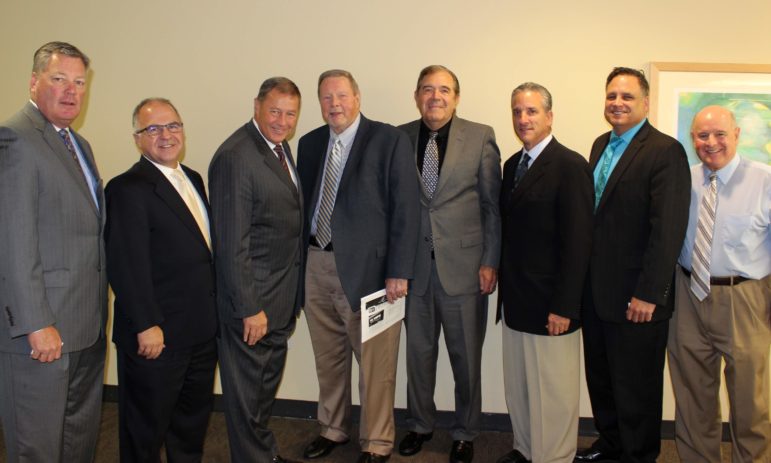On a recent afternoon, Friday before the Super Bowl, a group of workers at the Atlantic City Contact Center stood in a low-ceilinged office in a corner of The Claridge’s parking garage. The place smelled of onions and pasta salad. They were eating subs off paper plates, brought in by one worker who commutes from Glassboro, though the office is six blocks from the (World Famous) White House Sub Shop.
“They’re expensive,” John Ciaramella, president of the ACCC, said of the local White House subs, “and we’re watching our pennies.”
ACCC, not to be confused with the nearby community college of the same acronym, opened in 2015 amid considerable fanfare. The center was supposed to start a new era of economic diversification in Atlantic City. State and local officials attended the ribbon-cutting ceremony. Its business plan was to sell services to utility companies, who always need call-center workers to answer customer questions about gas and electric bills. City and county bond-offering documents touted the project to lenders as evidence new jobs and businesses were coming to South Jersey.
But as politicians posed for photos with and signed certificates to honor the businessmen who said they were bringing jobs to the city, behind-the-scenes documents painted a different picture. A former shareholder alleged in court the company bribed its only customer. Tax liens showing thousands of dollars in unpaid taxes were piling up. One of the company’s shareholders was tied to an offshore company named in the “Paradise Papers” leak. And where exactly were all those jobs, anyway?
The ACCC got its start with the help of a $32.7 million state tax credit from the New Jersey Economic Development Authority. Then last summer, amid hearings in Trenton on the outsized influence of South Jersey powerbroker George Norcross in the tax credit program, the EDA slashed the ACCC’s tax incentive entitlement to $1.5 million, a cut of 95%.
Ciaramella and his business partner, Warren Golden, are from Brooklyn and have known each other since seventh grade. They ran a call center in the Philippines that they had spun out from their prior business experience in the catalog sales industry (in Golden’s case) and in direct mail (in Ciaramella’s). They could have retired on the back of that business, they said. But Ciaramella, who lives in West Atlantic City and has been president of the Brighton Towers condominium association for the last 18 years, said he wanted to start a new business that would bring jobs to Atlantic City.

Golden launched ACCC as a subsidiary of his company Hollygold Enterprises. (There is not much public information available about Hollygold, except that one of its shareholders is an offshore company called CCT Group registered in the Cayman Islands tax haven.) Hollygold became the parent of the Philippines call center, Netcast BPO and the ACCC. The two sister call-center companies registered onshore to do business in New Jersey, at the same time as they applied for the state tax credits.
As part of its application to the EDA in 2015, the ACCC committed to hiring 332 new full-time employees. By 2019, they told the EDA they had about 80 long-term staff on salaries of $23,000 per year. The company’s sole client was Public Service Enterprise Group, New Jersey’s largest public utility, which was itself under investigation over $55,000 it tried to give a dark-money group linked to Norcross not long after it (PSEG) received $300 million per year in subsidies.
Ciaramella and Golden had no experience selling services to utilities. They were not prepared for how long it would take to win those companies’ business, they said. Still, Ciaramella said he stuck with utilities as the focus for ACCC’s business because he believed those companies would bring work that would mean steady, year-round jobs for Atlantic City workers.
Ciaramella and Golden had committed to invest $667,500 to build the call center. But according to a lawsuit filed by former ACCC shareholder Michael Shane, Golden and Ciaramella wanted to borrow $600,000 from a tax-credit broker or consultant known as Garden State Incentives Group. They planned to repay the loan by selling the credits, with GSIG as their broker. Then instead of using the proceeds to build the center, they transferred the money to Netcast BPO, the other company they controlled, Shane alleged.
More explosively, Shane also alleged in the lawsuit that ACCC’s first customer, PSEG, was bribed. “Golden suggested to Shane that in order to increase revenues for ACCC, Golden would pay a bribe or kickback to a principal officer of Company A, a potential ACCC customer whom Golden knew. Shane told Golden that he would not tolerate those kinds of business practices at ACCC. Months later, Shane learned that Company A became a customer of Netcast BPO.”
Ciaramella and Golden said there was no misuse of the money and the lawsuit has been resolved. Shane, who did not respond to messages, is no longer a shareholder.
Noel Christmas, president of Utility Workers of America Local 601 which represents ACCC workers, said he was in contact with Warren and Golden not long after he talked to politicians in Trenton about PSEG’s use of offshore call centers in 2011. Christmas, whose union also counts PSEG call-center workers as members, said New Jersey ratepayers should not be paying for workers in Georgia or Pennsylvania. Politicians sympathized. Later that year or some time the next, he first spoke to Warren and Golden about a New Jersey-based call center. (PSEG itself tried to apply for tax credits and threatened to move out of state in 2010, but was rejected.)
Ciaramella said he and Golden were introduced to PSEG through Ed Salmon, the chairman of industry lobbying group NJ Energy Coalition. Ciaramella and Golden said their advertising agency suggested Salmon, who worked as a consultant to introduce them to utility companies at industry conferences. That was how they first got a trial contract for 10 staff from PSEG in 2016, Ciaramella said.
Could Shane have confused the consultant’s fees for a kickback to a principal officer? PSEG is part of the NJ Energy Coalition and, in 2017, Salmon gave testimony in the state senate in favor of the $300-million-a-year nuclear-program credits for PSEG. No, Ciaramella said. “The allegations outlined in the lawsuit were completely untrue and without merit. The lawsuit was terminated and settled,” wrote Ciaramella in an email. “While we do communicate with Michael on possible business matters, he is no longer a partner and his shares in ACCC were bought out about 6 months ago.”
Shane and Salmon did not respond to requests for comment. Neither did Mike McCann, a principal with Garden State Incentives who was named in the lawsuit and had agreed to sell the Atlantic City Contact Center credits. McCann’s attorney in the case, Harris Neal Feldman, also declined to comment. (Feldman, incidentally, works for Parker McCay, the law firm that had a “significant impact” in editing the 2013 Economic Opportunity Act that established special credits for Atlantic City and Camden). PSEG did not respond to a request for comment.
While the lawsuit loomed in the background, the federal government was filing liens against ACCC to seek payment on more than $100,000 in unpaid taxes. Ciaramella said the company is working out a payment plan with the Internal Revenue Service. The company is paying its current taxes, he said, and now it has a second customer (New Jersey Resources, signed this year). But Ciaramella said if the company’s tax credits are limited to $1.5 million, it will take much longer to pay off its debts and hire more employees.
The EDA took another look at ACCC’s job numbers under tougher standards last year, and the value of the tax credits shriveled to less than a tenth of the amount approved on their original application. Ciaramella said the GSIG loan would be repaid more quickly if the tax credits were approved under the EDA’s original scoring method, which would mean around $10 million for ACCC.
The EDA confirmed it is reviewing the ACCC’s appeal of the Authority’s decision to cut the credits.
On the Friday before the Super Bowl, Ciaramella typed out an email to an employee who’d won glowing praise from a PSEG customer on a call. On his desk sat a photo of him with Golden, Atlantic City lawyer Lloyd Levenson and Gov. Phil Murphy. On the wall was a certificate of recognition from State Sen. Jim Whalen and Assemblyman Vince Mazzeo, early supporters of the call center.
“I supported Governor Murphy,” Ciaramella said. “We went to a number of fundraisers for him. It’s not that I’m angry with the administration at all. I was a Democrat and I voted for him,” he said. “But I just think that the way these tax credits are being applied to us is just not fair.”
Golden, in a phone interview last summer, said he believed the tax credits were revised down because of the Governor’s taskforce investigation of the program. “We believe we’re being victimized by people who took advantage of the law.” Golden said.
Golden and Ciaramella said they have invested more than $3 million in the company to date. They expected more support from local and state officials. They thought the tax credits would draw more businesses to the area and that would help them, too. “I mean, why would you set up a tax incentive program in two cities [Atlantic City and Camden] that you know desperately need jobs, and then change the rules?” Ciaramella asked. “Why would you do that?”
“We should be the poster child for tax credits because we’re the company that came into Atlantic City and brought in a new industry,” Ciaramella said. “We thought we had a very good case.”
The company will seek to appeal the EDA’s decision to cut its tax credit entitlement before the Authority’s March board meeting. “We know we’re going to do our best to make our case again,” Ciaramella said. “Hopefully they’ll see that we’re the type of company that the tax credits were prepared for.”
Document List:
NJEDA board memo on $32.7 million tax credit for ACCC, 2015
NJEDA revision to ACCC tax credits, June 2019
Updated NJEDA incentives rules, 2017
Governor’s Task Force on EDA Incentives, June 2019
Michael Shane Enterprises v. Atlantic City Contact Center, 2016
PSE&G use of out-of-state workers upsets union – NJ.com May 2011
PSE&G committed to buying SMR from Holtec, winner of $260mln tax credit
